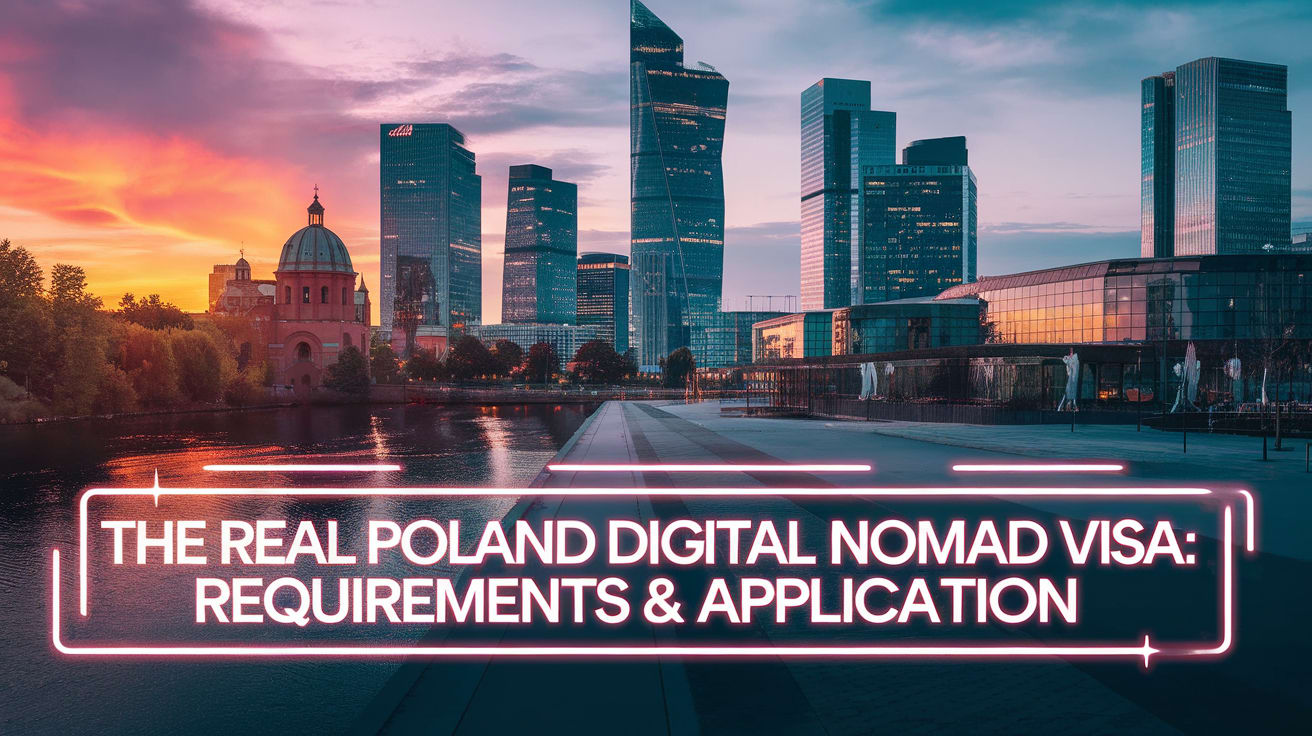Poland Digital Nomad Visa 2025
According to Wikipedia, the digital nomad movement has fundamentally reshaped how professionals view the intersection of work and travel, creating a new ...

Poland for Digital Nomads: The Definitive 2025 Guide
Authority Insight: We grounded this article in guidance from Wikipedia and Bbc so every recommendation reflects the latest policy and on-the-ground expertise for Poland Digital Nomad Visa 2025.
According to Wikipedia, the digital nomad movement has fundamentally reshaped how professionals view the intersection of work and travel, creating a new class of global citizens. As countries race to attract this mobile talent, Poland has quietly emerged as a top-tier destination, prized for its vibrant cities, low cost of living, and strategic position in the heart of Europe. You've likely seen Krakow and Warsaw climbing the ranks on remote work forums, celebrated for their fast internet and rich culture. But as you start planning your move, you run into a confusing, critical question: what about the visa?

If you’ve been searching for the "Poland Digital Nomad Visa," you've probably hit a wall of conflicting information. Let's clear the air right from the start: as of 2025, Poland does not offer an officially designated visa with that name. This single fact is the source of most confusion, but it is not the end of the story. Far from it.
Your Gateway to Working Remotely from Poland
While the "digital nomad visa" label doesn't exist in Polish immigration law, the country provides several established and highly effective legal pathways for non-EU freelancers, entrepreneurs, and remote workers to live and operate legally within its borders. This guide is designed to cut through the noise and provide a definitive roadmap to these options. It’s for the self-employed professional, the remote employee with a foreign contract, and anyone looking to make Poland their home base for a year or more.
The landscape of remote work is constantly shifting. As highlighted in recent reports by the BBC, countries are adapting their policies to attract skilled individuals who are no longer tied to a physical office. Poland’s approach, while not as flashy as some of its European neighbors, is practical and well-established, focusing on legitimate business activity as the foundation for residence. This makes understanding the correct terminology and process absolutely essential for a successful application.
What You'll Learn in This Guide
This article will serve as your comprehensive resource for legally establishing yourself as a remote worker in Poland. We will walk you through the entire process, step-by-step, to ensure you have the clarity and confidence to move forward. You will learn:
- The Two Primary Visa Pathways: A detailed breakdown of the Type D National Visa and the Temporary Residence Permit (Karta Similar to the Netherlands Digital Nomad Visa, this visa offers competitive benefits.
As promised, let's dive into the most direct and well-trodden of these pathways. This route forms the foundation of your legal stay and is the key to unlocking long-term residence in Poland.
The Real Poland Digital Nomad Visa: Requirements & Application

While Poland hasn't launched an official "Digital Nomad Visa" like some other countries, it offers a clear and established pathway for remote workers and freelancers to live and work there legally. The most common route involves obtaining a Type D National Visa on the basis of running a business in Poland. This means you’ll register as a sole proprietor and essentially become your own Polish-based employer. Let's break down exactly what you need and how to do it.
Eligibility and Document Requirements
To successfully navigate this path, you need to prove you are a legitimate business owner with the financial stability to support yourself in Poland. The authorities want to see a serious, well-prepared applicant, not someone simply looking for a long-term tourist visa.
Key Eligibility Criteria:
- Non-EU/EEA/Swiss Citizen: This pathway is designed for third-country nationals.
- Provable Remote Work/Client Base: You must be able to demonstrate that you have existing clients or a remote job that will provide your income.
- Intent to Register a Business: You must be willing and able to register as a sole proprietor (
jednoosobowa działalność gospodarcza) in Poland. - Clean Criminal Record: A certificate proving you have no criminal history is mandatory.
Your Document Checklist:
This is the most critical part of your application. Ensure every document is up-to-date and meets the specific requirements of the Polish consulate in your country.
- Valid Passport: Must be valid for at least six months beyond your intended one-year stay and have at least two blank pages.
- Completed National Visa (Type D) Application Form: This must be filled out, printed, and signed. You can typically find this on the Polish e-Konsulat system.
- Passport-Sized Photos: Two recent, biometric photos that meet Schengen visa standards.
- Proof of Health Insurance: A policy valid across the entire Schengen Area with a minimum coverage of €30,000 for medical emergencies and repatriation.
- Proof of Accommodation: A signed lease agreement for an apartment in Poland or a formal letter of invitation from a resident. A simple hotel booking is usually not sufficient for this long-stay visa.
- Proof of Sufficient Financial Means: This is crucial. You need to show you can support yourself without relying on Polish social assistance. While there's no single magic number, a widely accepted benchmark for European nomad visas is an income of at least €2,500 per month. You can prove this with:
- Bank statements from the last 3-6 months.
- Contracts with clients showing regular monthly payments.
- A letter from your remote employer.
- Criminal Record Certificate: An official certificate from your home country, which may need to be apostilled and translated into Polish by a sworn translator. Check the specific requirements at your local consulate.
- Supporting Business Documents: A business plan, a portfolio of your work, or letters of intent from clients can significantly strengthen your application. If you're considering other European destinations, check out the France Digital Nomad Visa.

Once you have gathered this comprehensive list of documents, the next step is to apply them strategically. Understanding the official requirements is one thing; navigating the process with real-world insights is another. This is where preparation and expert advice can make all the difference in ensuring a smooth and successful outcome.
A Practical Guide to Living and Working in Poland

Navigating the path to legally work remotely in Poland requires a clear strategy. While the country hasn't rolled out a specific "digital nomad visa," the existing framework for self-employment offers a solid and popular route. This guide breaks down the process with expert tips, real-world examples, and a clear cost analysis to help you make your Polish remote work dream a reality.
Expert Tips & Best Practices
Getting your legal status sorted in Poland is more about preparation than anything else. Here are some proven strategies to streamline the process:
- Embrace the Sole Proprietorship Model: The most reliable path is registering a Polish sole proprietorship (
jednoosobowa działalność gospodarcza). This formally establishes you as a business entity in Poland, making you eligible for a long-stay national visa (Type D) and, subsequently, a Temporary Residence Permit. Don't be intimidated by the Polish name; many local accounting firms specialize in helping foreigners with this process for a reasonable fee. - Prepare Documents Before You Arrive: You will need a certified criminal record check from your home country, and it will likely need to be translated into Polish by a sworn translator. Do this before you leave, as it can be difficult and time-consuming to arrange from abroad.
- Prove Your Financial Stability Clearly: The requirement for "sufficient funds" can be vague. A good rule of thumb is to aim for the unofficial European standard of at least €2,500 in monthly income. The best way to prove this is with client contracts that clearly state your monthly retainer or project fees, supplemented by several months of bank statements.
- Optimize Your Tax Situation: One of the biggest advantages of the sole proprietorship route is access to favorable tax schemes. You can opt for a flat tax rate, which is currently a very competitive 17% for many tech and creative professions. This is a significant draw compared to the standard tax rates in many other European countries.
- Local Bank Account is Key: Open a Polish bank account as soon as possible. It simplifies paying for fees, receiving payments from clients, and demonstrating your financial ties to the country, which is a crucial part of your residence permit application. For a similar visa program, see our comprehensive Best Tax Havens for Digital Nomads in 2025: guide.
Real-World Scenarios: The Good and The Challenging
Learning from others is the best way to avoid common pitfalls. Here are two common scenarios for digital nomads heading to Poland.
Case Study 1: The Successful Planner (Maria, a Graphic Designer from Brazil)
Maria wanted to base herself in Kraków. Before leaving Brazil, she secured a notarized and translated criminal record check. She entered Poland on a 90-day Schengen tourist visa to scout for an apartment. With a signed one-year lease agreement in hand, she engaged a local advisory firm. They handled her sole proprietorship registration and helped her prepare the application for a Type D national visa. She submitted her application at a Polish consulate in a neighboring country (as you often cannot apply from within Poland on a tourist visa). Her application, supported by three long-term client contracts and a Polish bank account statement, was approved. Nine months later, well before her visa expired, she successfully applied for a three-year Temporary Residence Permit, giving her long-term stability.
- What she did right: Extensive preparation, securing accommodation first, and using professional help for the bureaucracy.
- Lesson learned: Investing a few hundred euros in professional assistance can save months of stress and potential mistakes.
Case Study 2: The Underprepared Freelancer (David, a Coder from the UK)
Following Brexit, David, a UK citizen, assumed he could easily work from Warsaw for a few months. As the BBC and other outlets have reported, the rules for UK citizens have changed significantly. He arrived on a 90-day tourist allowance and continued working for his UK clients, assuming it was fine. When he decided he wanted to stay longer, he realized he couldn't apply for a work-based permit from inside the country. His 90-day limit was approaching, forcing him to leave the Schengen Area, disrupting his life and work. He had to start the entire visa process from the UK, causing significant delays. You might also be interested in our guide to the Romania Digital Nomad Visa.
- What he did wrong: Made assumptions based on pre-Brexit rules and started the legal process too late.
- Lesson learned: Always begin the visa and business registration process from your home country or a country where you have legal residence. Check the latest entry requirements on official government sites or a trusted source like Wikipedia's visa policy page for the Schengen Area.
Cost Breakdown: Budgeting for Your Move
While Poland is one of Europe's more affordable countries, the setup process involves several fees. Here’s a realistic budget:
- Type D National Visa Application Fee: €60
- Sole Proprietorship Registration: ~€200 (if using a service)
- Temporary Residence Permit (Karta Pobytu) Fee: ~€100
- Sworn Document Translation: €20-€50 per
Further Reading & Sources
- En.Wikipedia.Org – Digital Nomad
- En.Wikipedia.Org – Travel Visa
- Bbc.Com – News
- En.Wikipedia.Org – Visa Policy Of The Schengen Area
- Englishwizards.Org – Digital Nomad Visa Poland
- Esim.Holafly.Com – Poland Digital Nomad Visa
- Interstride.Com – Top Digital Nomad Visas In Europe 2025
- Globalcitizensolutions.Com – Digital Nomad Visa
- Wandrly.App – Poland
- Acvian.Com – Poland For Expats The Ultimate 2025 Guide
- Reddit.Com – Advice On Visaresidency Application
- Whistlinghound.Com – Poland Digital Nomad Guide
- Gov.Pl – Visas
- Deel.Com – Moving To Poland For Expats
- Englishwizards.Org – Freelance Visa Poland
- Deel.Com – How To Get A Visa And Work Permit In Poland
Final Reminder: Stay compliant with Poland digital nomad visa 2025 to protect your move.